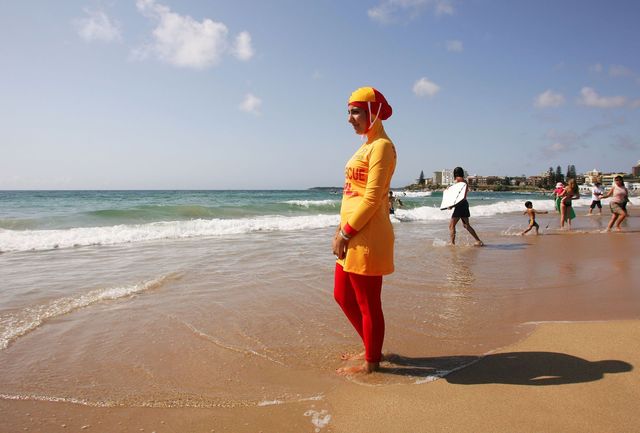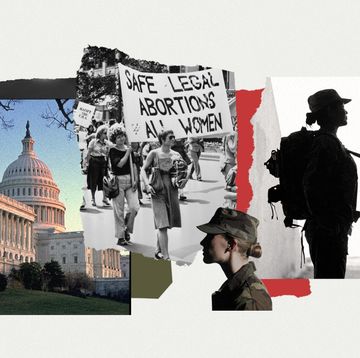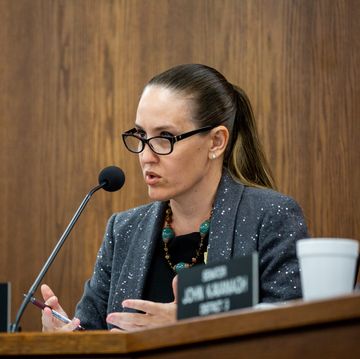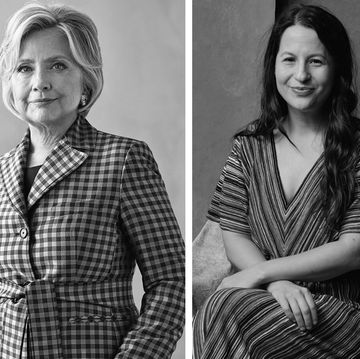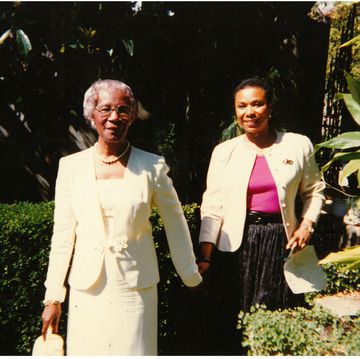It happened in public, beneath a brilliant sun. A trio of armed men surrounded a woman on a beach and demanded she take her top off. Onlookers took photos. The pictures were shared all over the Internet.
But the men won't face any consequences because they haven't committed a crime. They're policemen in Nice, France. And as far as the law is concerned, they're innocent.
At least 15 French towns—and Nice, too—have banned the burkini, a swimsuit that covers women's bodies and heads in accordance with their religious practice. The woman whom the men approached was not dressed in one, but she did have on a modest blue tunic and ankle-length black leggings. Once the police arrive, the photos show her as she removes her tunic. She's crouched on the sand. The officers tower over her.
For now, the woman has yet to make a public statement. But elsewhere in France, a woman has come forward to say she was fined this week for wearing a tunic and a head covering on the beach in Cannes. She was issued a ticket for dressing in clothes that do not "[respect] good morals and secularism."
France has prized secularism or "laïcité" since the French Revolution and the principle became a formal tenet of law in 1905. Since the population of Muslims in France has grown over the past several decades, the French seem to have doubled down on the precept. In 2004, all "conspicuous" symbols of faith were banned from state-run schools and civic events. As of 2010, women are not permitted to fully cover their faces in public. The Economist summed up the fallout in 2014:
Critics accuse France of illiberalism, of curbing freedom of religious expression, and of imposing a Western interpretation of female oppression.... For the French, however, it is part of an unapologetic effort to keep religious expression private, and to uphold the country's republican secular identity.
But no matter the roots of the controversy, the rhetoric around how Muslim women dress has gotten more extreme. A mayor in Corsica has banned burkinis to "protect the population." A tribunal in Nice deemed the law in nearby Villeneuve-Loubet a "necessary, appropriate and proportionate" response to recent terrorist attacks in France. The swimsuit was bound to "offend the religious convictions or non-convictions of other users of the beach" and could even be interpreted as "a provocation." French Premier Manuel Valls insisted that the burkini symbolizes Islam's "enslavement of women." French Minister for Families, Children and Women's Rights Laurence Rossignol exclaimed that observant Muslims "hide women's bodies in order to better control them."
Marine Le Pen painted the issue in explicitly nationalist terms. "France does not lock away a woman's body," she said. And by extension, Islam keeps her in chains.
Reminder! If you think your progressive values can only survive when women's bodies are policed, you've already lost them.
I find it hard to believe that women are freest when representatives of the government can order them to undress on a beach. Whatever women wear, social tensions have forever been hashed out on their bodies. Whether they are stripped down or covered up, someone will always find a way to tell a woman in public that her very existence is "a provocation." It seems obvious, but here we are! Let's be very clear: It is just as illiberal to snarl that a woman in public should "put some clothes on" as it is to force her to reveal more than she chooses.
When fear cripples a population, it's women who suffer, it's women's bodies that become provocative, improper, a "problem." Over and over, we've seen people in power lose track of who the real marks are. It must seem so much easier to fix the viewfinder on women. It's true—we're everywhere!
Writing in the Guardian, the creator of the burkini said that she invented the swimsuit "to give women freedom, not to take it away."
"So who is better," she demanded, "the Taliban or French politicians? They are as bad as each other."
